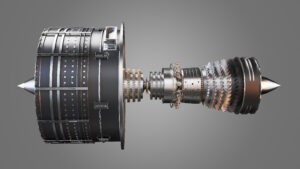 Abrasive flow machining is rapidly becoming the preferred finishing method for manufacturers of today’s high-performance parts. The AFM process effectively removes burrs and other surface imperfections without causing damage to a part. It can finish parts with a high level of precision, improving performance, durability, and aesthetic appearance.
Abrasive flow machining is rapidly becoming the preferred finishing method for manufacturers of today’s high-performance parts. The AFM process effectively removes burrs and other surface imperfections without causing damage to a part. It can finish parts with a high level of precision, improving performance, durability, and aesthetic appearance.
What Do We Mean by Complex Surface Geometries?
One area where AFM excels is the finishing of parts that possess what are referred to as intricate geometries. These types of parts typically have complex and detailed shapes, contours, or features, including curves, angles, patterns, or other intricate design elements requiring precision and careful manufacturing. Because of their complex surface features, finishing these parts to spec often demands specialized processes, tools, or technologies, such as AFM.
Examples of industrial parts with complex surface geometries include:
- Aircraft engine components, such as turbine blades and compressor blades
- Molded plastic parts used in products like plastic housings, panels, or covers.
- The outer casings of turbines that are used in power generation or aviation applications.
- Medical implants such as hip or knee replacements often have complex surface geometries to match the anatomy and function of the human body.
- Components used in tool and die manufacturing, like molds and dies, often have complex surface geometries to produce intricate shapes.
- Custom machine parts.
- 3D printed parts.
- Structural elements in aircraft, spacecraft, or satellites.
- Gears with complex tooth profiles and surface geometries for efficient power transmission.
The Abrasive Flow Machining Process
The AFM process uses a viscous, semi-solid abrasive flow media to polish and deburr parts. The abrasive flow media is hydraulically forced along a workpiece’s inner and outer surfaces. As it does so, the abrasive flow smooths the workpiece by scouring away burrs and rough spots.
The process is particularly suited for parts with complex and intricate internal shapes or contours, which can be challenging or even impossible using more traditional machining methods. It provides a uniform material removal rate across the entire internal surface, ensuring consistency and eliminating the risk of uneven finishes. Since no cutting tools are used there is little risk of tool marks or damage to a workpiece.
AFM allows for precise control over parameters such as pressure, flow rate, and abrasive media characteristics, allowing manufacturers to achieve exacting surface finish requirements. It’s effective for parts made of almost any material, including metal, plastic, ceramics, and composites. The time the process takes depends on the hardness of the workpiece material.
Abrasive Flow Media from Deburring & Finishing Technologies
The success of any AFM job depends on the abrasive media used in the process. There’s no one-size-fits-all abrasive media; different workpiece materials require different abrasive media to achieve the desired results. The choice of abrasive material, its density, and viscosity are just a few of the factors to be considered when mixing abrasive flow media.
Deburring & Finishing Technologies has been a leading provider of abrasive flow media and abrasive flow machining services to companies in Pennsylvania and across the U.S. since 2009. Manufacturers know they can depend on our precisely formulated abrasive flow media for accurate and consistent finishing, no matter how intricate the surface features are.
You can contact Deburring & Finishing Technologies through our website or call us at (412) 849-1522 to discuss your abrasive flow media needs and get a free quote.
